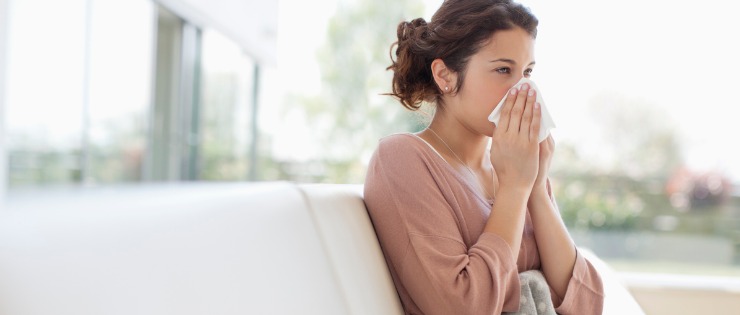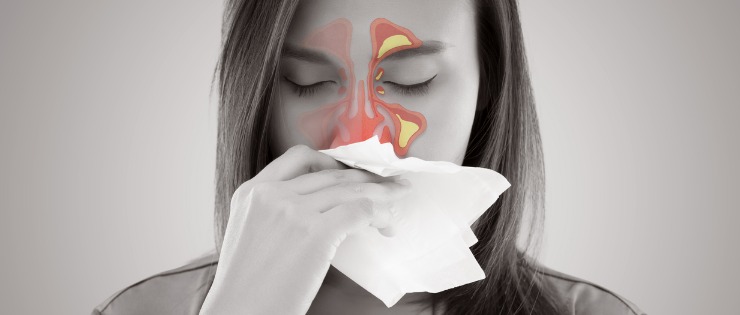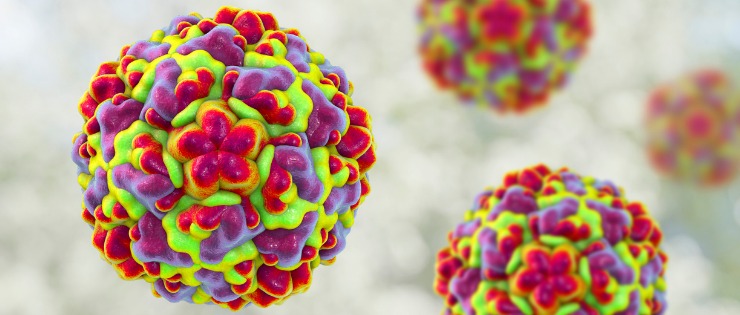
Do you have a runny nose, red eyes and headache while coughing and sneezing?
The symptoms of hay fever and a cold can feel the same which makes it hard to tell them apart.
It’s important to know what you are dealing with so you can get the right treatment. The people around you will also want to know because a cold is contagious but hay fever isn’t.
There are telltale symptoms you should look out for to tell if you have a cold or hay fever - in this article we look at the symptoms, similarities and differences and give you tips on how to treat both.
Is it a Cold or Hay Fever?
There is a long list of symptoms that are the same for a cold and hay fever but the main difference between the two is itchiness. If you have itchy eyes, throat, ears or palate then it’s likely you have hay fever.
Shared Symptoms of Cold and Hay Fever
- Running nose
- Red eyes
- Dry cough
- Sneezing
- Clear nasal discharge
- Congestion
- Headache
- Tiredness
- Difficulty concentrating
Symptoms of Common Cold Only
- Coloured (yellow/green) nasal discharge
- Cough with mucous in the chest
- Sore throat is often the first sign of an impending cold
Symptoms of Hay Fever Only
- Itchy eyes or ears
- Itchy or scratchy throat or palate
Rhinitis
The common cold and hay fever have the same clinical category, rhinitis - the irritation and inflammation of the nasal cavity. Hay fever is the common name for allergic rhinitis.

Seasonal allergic rhinitis only occurs at certain times of the year while perennial allergic rhinitis can occur at any time of the year. The cause of non-allergic rhinitis is not known but there are several triggers including:
- Common cold or flu
- Environmental or occupational irritants like cigarette smoke, perfume, chemical fumes
- Changes in weather
- Food and drinks
- Hormone changes
- Medications
The Common Cold
A cold is a viral infection that usually last between three and 14 days. There are 200 different types of viruses that can cause a cold. Everyone is susceptible to catching a cold, particularly during winter.
Most people recover quickly but some people are at increased risk of the cold leading to other infections and health conditions. People who susceptible to health complications from a cold include: children under the age of six, smokers and people with chronic illnesses.
Causes of a Cold
The rhinovirus is the most common cause of a cold. It spreads through hand contact and touching contaminated objects like door knobs and light switches.

The virus can enter the body when a person touches their mouth, nose or eye. Infected people can spread the virus to others via droplets in the air after coughing, sneezing or talking. Most people will catch two to three colds each year.
The flu virus is a highly contagious respiratory infection that has similar but much worse symptoms that a cold.
Preventing a Cold
One of the best ways to prevent a cold is to wash your hands thoroughly with water and soap to remove the virus after touching contaminated surfaces. If you don’t have access to water, use a hand sanitiser.
Stay away from people who have a cold to reduce your risk although this is difficult when someone in your house or workplace has a cold. Disinfect surfaces they touch and don’t share towels or drinking glasses. Encourage them to use tissues and dispose of them immediately before washing their hands again.
Keep your immune system strong with a balanced diet and regular exercise.
Treating a Cold
It can take several weeks to recover from a cold.
Over-the-counter medication may be helpful if you have a cold. Lozenges can soothe a sore throat. Cough mixtures and topical rubs can also provide relief.
Mild painkillers like aspirin or ibuprofen can reduce the aches and pain in the head or body. Decongestants, antihistamines and a nasal spray may help with coughing, a runny, blocked, stuffy nose, sinus and sneezing.
If you have a cold there are several tips to keep in mind: drink plenty of fluids and get lots of rest to allow your body to recover. Some people like to add moisture to the air to relieve their nose and chest to help with sleeping. Saline spray or salt-water rinses can improve congestion in the nose and provide sinus relief.
Drinking hot liquids such as herbal teas and lemon drinks can help relieve symptoms.
Unless the cold has caused a secondary infection like strep throat or pneumonia or caused a complication like an ear infection or asthma, prescription medications (like antibiotics) are not needed to treat a cold.
Hay Fever
One in five Australians suffer from hay fever. Asthma and hay fever are closely linked - 80% of people with asthma also have hay fever.
Causes of Hay Fever
Hay fever is an allergic reaction something in the environment like pollen or plants, dust, dust mites, animal dander (microscopic flakes of fur and skin), cockroach droppings or mould.

When the body encounters an allergen, it treats it like a foreign particle. The body releases histamines to protect it from the invaders which causes the coughing, sneezing and itching. Symptoms often disappear quickly when the allergen isn’t present.
First time hay fever can be triggered by a cold or flu due to the stress on the immune system.
Preventing Hay Fever
The only way to prevent hay fever is to remove yourself from the allergen. You may reduce the impact of some allergens like dust and mould spores with regular, thorough cleaning of your house. Treating the house for cockroaches can also provide relief if they are the suspected allergen. Cut down the amount of animal dander by moving pets outside.
If your allergy is seasonal, try to stay indoors as much as possible when the pollen count forecast is high. If you go outdoors, change your clothes and wash your hair when you come in to reduce the amount of pollens on your body.
Hay fever can occur any time of the year if an allergen is present, but it is more prevalent around spring time when the pollen count is high.
Treating Hay Fever
Severe hay fever can impact on your quality of life. Constantly sneezing and coughing makes work difficult and stops you from enjoying life. Hay fever can interrupt sleep, making you irritable and unable to concentrate during the day. A lack of sleep can weaken your immune system, risking your health and increasing the risk of developing other health problems.
Fortunately there are many treatments to take care of your hay fever symptoms, it’s just a matter of finding the one that works for you.
Over the Counter and Prescription Medications for Hayfever
A wide range of medications are available over the counter at the pharmacy or with a prescription from your doctor.

Antihistamine Tablets and Spray
Antihistamines block the body’s ability to produce histamines that cause the inflammation. They are the most common form of treatment for people with mild hay fever as they provide relief for most symptoms but aren’t as effective for a blocked nose.
In the past, most antihistamines caused drowsiness but there are now plenty of non-sedating antihistamines. Ask your pharmacist and read the instructions before taking. Antihistamine eye drops can provide relief from red, itchy eyes.
Corticosteroid Nasal Sprays
Steroid nasal sprays work by reducing the swelling in the nose lining, reducing nasal congestion and other symptoms. They can take a few days to take effect. Some sprays are available over the counter while others are only available on prescription. A saline nose spray can remove any allergens in the nose and reduce the mucous causing the cough. They can be used before the usual seasonal hay fever starts to prevent symptoms from developing.
Decongestant Spray and Tablets
Decongestant nasal sprays and tablets can unblock the nose. They can make it easier for a sufferer to breathe and sleep however they should only be used for a few days at a time.
Saline
Some people with hay fever find saline is enough to clear their nasal passage and wash allergens out of their nose. Others use a saline spray or irrigation shortly before using medicated nasal sprays to improve their effectiveness.
Immunotherapy
If your hay fever is ongoing and the symptoms are difficult to control, you may need your doctor to refer you to an allergy specialist. They can confirm the cause using an allergy skin test and, depending on your severity, recommend immunotherapy treatment. A course of injections over months or years exposes the body’s immune system to the allergen and trains it to not react as much. Immunotherapy can treat severe hay fever, animal allergies, insect bite and sting allergies and dust mite allergies.
Natural Remedies
Some people prefer to treat their symptoms with natural therapies because they don’t like to take medications regularly or their side effects are a problem. Everything from a hot shower to certain foods can make a hay fever sufferer feel better. It’s trial and error to find what works for you. Take care with all supplements and ask your doctor if they are safe as they can interfere with prescribed medicines.
Natural remedies for hay fever include:
Quercetin
Found in apples, onions, grapefruit and okra, quercetin provides an anti-inflammatory effect by reducing the inflammation in the airways. You can eat more quercetin-rich foods daily or take a quercetin supplement.
Stinging Nettle
Stinging nettle is a herb that may provide natural antihistamines. Research has shown study participants reported an improvement in their allergic rhinitis (hay fever) after taking a stinging nettle root extract.
Vitamin C
Another natural antihistamine, vitamin C is available in plenty of fruits and vegetables and as a supplement. You can increase your intake of vitamin C by eating three to five citrus fruit daily.
Bromelain
They have found bromelain to improve the inflammation and respiratory distress caused by allergies. Bromelain is in pineapples and available as a supplement. A study back in the 1960s showed bromelain reduced respiratory inflammation and could improve breathing in people with sinusitis.
Histamine-Rich and Inhibiting Foods
Some foods are more likely to trigger the body to release histamines. Fermented dairy products like yoghurt and cheese, fermented vegetables like sauerkraut, soy products like soy sauce and grains in sourdough are the main culprits. Cured fermented meats, alcohol, tomatoes, spinach and eggplant can trigger the body to release histamine. These foods are best avoided by allergy sufferers.
Fresh foods are more likely to work as histamine inhibitors. Citrus fruit, strawberries, bananas, papaya, nuts, spices, legumes, cocoa, seafood and egg whites can reduce the amount of histamine your body produces in response to an allergy.

Common Questions About Colds and Hay Fever
Can allergies seem like a cold?
When you have allergies, it can feel like you have a cold because the symptoms are similar. You may have a runny or blocked nose, sneezing, coughing and general malaise. However, there are small signs to tell you if it’s a cold or hay fever. With a cold, the symptoms usually develop slow over several hours or days and then disappear within 14 days. The symptoms of hay fever can come on suddenly with multiple symptoms appearing at once. Hay fever can last weeks, months or years depending on your exposure to the allergen.
Can you have allergies and a cold at the same time?
It is possible that your body can be under attack from allergies and a cold virus at the same time. As you recover from the cold, the symptoms will reduce until only the allergy symptoms remain.
Can hay fever turn into a cold?
It may feel like hay fever has become a cold, but it’s because you caught a cold on top of the hay fever. Hopefully, you have no symptoms after the cold but it’s possible that the hay fever may return or you’re infected with another cold virus.
Can hay fever cause a cough?
Hay fever sufferers can experience a persistent cough caused by watery mucous from the nose running down the throat and irritating it. The constant irritation or tickle leads to a cough.The cough may be worse at night - lying down means the mucous can’t drain as easily.
Cold or hay fever – what’s worse?
Neither a cold nor hay fever is pleasant to endure however with a cold at least you know it will clear within a week or two. With hay fever, the symptoms last much longer - for some people their hay fever symptoms never disappear.